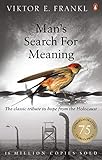Man's Search For Meaning book summary

The book is split into 2 parts. Part 1 talks about the author's time in the Nazi concentration camp, but told in a darkly humourous and stoic way. Part 2 takes on more of a scientific angle and talks about logotherapy, the author's theory of psychology.
Here are some of the most prominent excerpts that stood out to me.
Why we need meaning and how to find it
- “He who has a Why to live for can bear almost any How.” — Nietzsche
- Life is not primarily a quest for pleasure, as Freud believed, or a quest for power, as Alfred Adler taught, but a quest for meaning. The greatest task for any person is to find meaning in his or her life.
- ...it did not really matter what we expected from life, but rather what life expected from us. We needed to stop asking about the meaning of life, and instead to think of ourselves as those who were being questioned by life — daily and hourly. Our answer must consist, not in talk and meditation, but in right action and in right conduct.
- Life ultimately means taking the responsibility to find the right answer to its problems and to fulfill the tasks which it constantly sets for each individual.
- What matters, therefore, is not the meaning of life in general but rather the specific meaning of a person’s life at a given moment. To put the question in general terms would be comparable to the question posed to a chess champion: “Tell me, Master, what is the best move in the world?” There simply is no such thing as the best or even a good move apart from a particular situation in a game and the particular personality of one’s opponent.
- 3 possible sources in which a person can find his or her meaning of life:
- In creating a work or doing a deed;
- In experiencing something or someone;
- In suffering.
On happiness
- ...our current mental-hygiene philosophy stresses the idea that people ought to be happy, that unhappiness is a symptom of maladjustment. Such a value system might be responsible for the fact that the burden of unavoidable unhappiness is increased by unhappiness about being unhappy...he is not only unhappy but also ashamed of being unhappy...
- Don't aim at success. The more you aim at it and make it a target, the more you are going to miss it. For success, like happiness, cannot be pursued; it must ensue, and it only does so as the unintended side effect of one's personal dedication to a cause greater than oneself or as the by-product of one's surrender to a person other than oneself. Happiness must happen, and the same holds for success: you have to let it happen by not caring about it. I want you to listen to what your conscience commands you to do and go on to carry it out to the best of your knowledge. Then you will live to see that in the long-run—in the long-run, I say!—success will follow you precisely because you had forgotten to think about it.
On our self-determination and change
- They may have been few in number, but they offer sufficient proof that everything can be taken from a man but one thing: the last of the human freedoms — to choose one’s attitude in any given set of circumstances.
- The sort of person the prisoner became was the result of an inner decision, and not the result of camp influences alone.
- ...man is ultimately self-determining. Man does not simply exist but always decides what his existence will be, what he will become in the next moment...By the same token, every human being has the freedom to change at any instant...
- Man is capable of changing the world for the better if possible, and of changing himself for the better if necessary.
- When we are no longer able to change a situation, we are challenged to change ourselves.
- A human being is not one thing among others; things determine each other, but man is ultimately self-determining...In the concentration camps...we watched and witnessed some of our comrades behave like swine while others behaved like saints. Man has both potentialities within himself; which one is actualized depends on decisions but not on conditions.
On suffering
- But there is also purpose in that life which is almost barren of both creation and enjoyment and which admits of but one possibility of high moral behavior: namely, in man’s attitude to his existence, an existence restricted by external forces...But not only creativeness and enjoyment are meaningful. If there is a meaning in life at all, then there must be a meaning in suffering.
- In some ways suffering ceases to be suffering at the moment it finds a meaning, such as the meaning of a sacrifice.
- “What would have happened, Doctor, if you had died first, and your wife would have had to survive you?” “Oh,” he said, “for her this would have been terrible; how she would have suffered!” Whereupon I replied, “You see, Doc- tor, such a suffering has been spared her, and it was you who have spared her this suffering — to be sure, at the price that now you have to survive and mourn her.”
- But let me make it perfectly clear that in no way is suffering necessary to find meaning.
On living
- No man should judge unless he asks himself in absolute honesty whether in a similar situation he might not have done the same.
- Live as if you were living already for the second time and as if you had acted the first time as wrongly as you are about to act now!